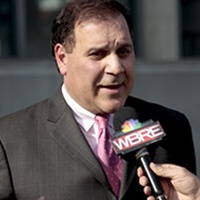 Le Raysville RICO Act Lawyers, Pennsylvania
Le Raysville RICO Act Lawyers, Pennsylvania
Sponsored Law Firm
-
 x
x

Click For More Info:
-
The Law Offices of Richard L. Cooper, P.A.
848 Brickell Avenue Suite 800 Miami, FL 33131» view mapDWI/DUI, Drug Trafficking, Felony Nationally Ranked Top 40 Under 40
With Richard L. Cooper you can expect a trusted confidant who will work diligently to fully understand your case and determine a road map to help you regain control of your life.
800-756-2781
Not enough matches for Le Raysville RICO Act lawyer.
Below are all Le Raysville Criminal lawyers.
Sponsored Lawyers
1-10 of 17 matches
Accident & Injury, Medical Malpractice, Criminal
Christian W. Francis is a trial lawyer serving Northeast Pennsylvania and the surrounding region. His practice is focused on representing individuals and small businesses in civil and commercial matters. In his civil practice, Christian concentrates on car and tractor-trailer accidents; medical malpractice lawsuits; slip and fall accidents; and, product liability lawsuits. Christian also defends individuals in all types of misdemeanor and felony crimes, from drunk driving (driving under the influence/DUI) to major crimes, in both state and federal courts. Christian has successfully handled trials and appeals to the Superior Court on behalf of his civil and criminal clients. Christian completed his undergraduate studies at Pennsylvania State University and received his law degree from the University Of Pittsburgh School Of Law. During law school, he clerked for a District Judge in the U.S. District Court for the Western District of Pennsylvania and worked for several prominent civil litigation firms in Pittsburgh. Most recently, he worked for a large regional defense firm where he defended insurance companies, hospitals, and a multinational transportation company in civil and commercial matters. Christian's experience defending these organizations in high stakes litigation has given him a distinct advantage that he can now use against these types of defendants in his current practice. Christian is admitted to practice in all of Pennsylvania’s state courts and the United States District Court for the Middle and Eastern Districts. Born and raised in the area, Christian currently resides in South Abington with his wife and three children.
(more)Criminal
People who are looking for an attorney are usually at some of the worst times in their lives. Whether you’ve just been arrested or have been injured because of someone else’s negligence, Michael will be there to help you and your family through the turbulent waters of the legal system. Admitted to practice in the Courts of the Commonwealth of Pennsylvania and the United States District Court for the Middle District of Pennsylvania, Michael is a litigator who started his career clerking for the Honorable Vito P. Geroulo in the Court of Common Pleas of Lackawanna County. After learning how the legal system works from within a judge’s chambers, he began advocating in the criminal justice system as an Assistant District Attorney in the Lackawanna County District Attorney’s Office. He would later be appointed as a Special Prosecutor, assigned to the Northeastern Pennsylvania Auto Theft and Insurance Fraud Taskforce which has the jurisdiction to prosecute cases in 13 Pennsylvania Counties. He would later be named the Deputy District Attorney and Chief Prosecutor of the Felony Drug and Gun Crime Unit and was appointed as a legal advisor to the Lackawanna County SWAT team. During his time as a prosecutor, he had the opportunity to gain crucial experience in handling cases in the criminal justice system. He would hone his skills in legal research and writing, the questioning of witnesses and became comfortable arguing and presenting cases in the courtroom. Through his tireless work ethic, he prosecuted an array of crimes including Murder, Assaults, Gun Crimes, Felony Drug Offenses, DUI’s and other crimes, taking several cases to verdict in front of a jury. After his time as a prosecutor, Michael shifted his legal practice to the private sector where he could utilize the knowledge, experience and time in the courtroom he had gained early in his career to advocate for clients on a much broader scale. Still maintaining his work ethic and passion for the law, he has helped clients with their criminal defense, car accidents, truck accidents, slip and falls, landlord tenant disputes, dog bites and much more. No matter how big or small a case may seem, if someone comes to him for legal representation, he will work hard to appropriately represent them in their time of need.
(more)Accident & Injury, Workers' Compensation, Estate, Criminal, Real Estate
Joseph S. Toczydlowski is a Pennsylvania attorney with 20 years of experience. Joseph is a graduate of Scranton Prep. He obtained a Bachelor of Science degree from the University of Scranton in chemistry/business. He studied law at the Duquesne University School of Law in Pittsburgh. He earned his Juris Doctorate degree in 1995. After graduating from law school, Joseph accepted a position as Assistant District Attorney for the Lackawanna County District Attorney’s Office where he prosecuted hundreds of criminal cases including numerous jury trials. He remained in this position until 1999. In 2000, Joseph was elected for a six year term as Magisterial District Judge for Judicial District 45-3-04. Joseph has also maintained a private practice of law since 1996. His general practice of law has evolved into a multi-discipline practice capable of professionally assisting almost any individual or small business needs. Joseph understands how difficult it can be to deal with legal problems. Regardless of the nature of your case, he will always treat you with compassion and dignity throughout the case. He will also be available to answer your questions, educate you on your legal matters and provide professional assistance every step of the way.
(more)Criminal, DUI-DWI, Misdemeanor, Felony
Over the past 30 years, Joe D’Andrea has earned a reputation as one of the premier criminal defense attorneys in Northeastern Pennsylvania, while aggressively defending the rights of individuals charged with various felonies and misdemeanors in both State and Federal Courts. Throughout his career, Scranton criminal lawyer Joe D'Andrea has zealously represented hundreds of individuals, corporations, and business entities that have been accused of crimes, which include, but are not limited to, Murder, Vehicular Homicide, Manslaughter, Rape, Delivery and Possession with Intent to Deliver a Controlled Substance, Child Pornography, DUI, White Collar Crimes, Assault, Arson and Forgery. Based upon his proven results and prolific reputation, Joe has had the pleasure of representing a diverse client base, which includes political officials, doctors, lawyers, bankers, “average Joes and Janes”, students, and pro bono representation of indigent defendants.
(more)



 Richard L. Cooper Miami, FL
Richard L. Cooper Miami, FL AboutMiami Attorney at Law
AboutMiami Attorney at Law ServicesCriminal Defense
ServicesCriminal Defense




